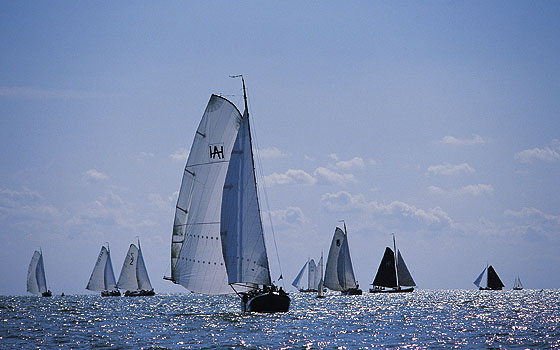Separating fact from fiction isn’t easy when it comes to Erksine Childers, but I’ve been inspired to follow in his wake, says Dick Durham
Dick Durham:
In my youth I made three voyages to the Frisian Islands hoping to get beneath the skin of author Erskine Childers who based his world-famous novel The Riddle of the Sands on a real cruise he made there himself 120 years ago this year.
The first I made was in Almita, my 26ft, engineless centreboarder built in 1906 and I visited Texel with its wondrous driftwood museum, Vlieland with its subsiding 17th-Century houses, once inhabited by whalers and admirals, and Terschelling, off which the Lutine sank full of gold. But my holiday time ran out and I had to sail home before venturing further.
My next visit was in Powder Monkey, a 30ft Alan Buchanan Yeoman Junior. We re-visited Vlieland and Terschelling and managed a new island, Ameland, but the boat’s four-foot-six-inch draught was restrictive and with old charts I spent more time aground than afloat.
My last voyage was in Sea Boots, a Sadler 25 owned by a work colleague, Tim Cornall. In her we sailed to the last Dutch island, Schiermonnikoog, the most beautiful of them all. But, as with my first visit, the office called us back and we never made the first of the German Frisian islands, Borkum.
So imagine my excitement at the news that former Commodore of the Royal Yacht Squadron, Maldwin Drummond has brought out a new illustrated edition of his matchless work, The Riddle (Unicorn Publishing Group, January 2017) in which Drummond cruises the Frisians in his own boat as a sailing detective to unravel fact from fiction in Childers’ 1897 voyage aboard Vixen, a converted RNLI lifeboat.
Was The Riddle of the Sands based on a real threat, or not? Had its author Erskine Childers witnessed something tangible which made the military take him seriously, or not? Can the legacy of the book help us understand the inertia of the First World War as the centenary of that conflict is remembered?
Maldwin Drummond has got closer than anyone to answering those questions and his book is the result of a three-year investigation made by sea, by land and by air, interviewing Childers’ family, researching archives and consulting naval historians.
Erskine Childers was a man book-ended by empire. When he set out in Vixen, for the German coast, he was a patriot. The British Empire was at its zenith. Just two months before, Queen Victoria, celebrating her Diamond Jubilee, sent a telegram to every corner of the largest empire in history, which covered a quarter of the world’s population: ‘Thanks my beloved people. May God bless them.’
Twenty-five years later that same empire was beginning to crack up. Riots in India and unrest in Egypt foretold the end, while bloodshed in Ireland, most intractable of them all, had put Childers in a death cell, condemned as an unsanctioned republican.
His real-voyage boat, Vixen, he re-named Dulcibella after the boat in the novel (both of which were named after his favourite sister), adding further to the labyrinthine mix of fact and fiction. She was a gaff-cutter in real life, in fiction she was both cutter and yawl. She was burnt in 1949, 27 years after Childers’ death and her iron keel lies somewhere beneath a housing estate in Lymington.
The new book can never be bettered as many of the people Maldwin interviewed are now dead, including Erskine’s son Robert, Frank Carr, one-time director of the National Maritime Museum and also a yachtsman, and Lord Runciman.
The book has inspired me to sail once more to the half-tide waterworld that Childers immortalised, so I am now on the look-out for a new boat. She must be a centreboarder so that I can dry out on the sands where Childers made his home most nights during his four-month, 2,000-mile cruise to the Baltic and back.
Dick Durham Podcast January 2017
Dick Durham: Why is it that most of our sailing heroes, from Chay Blyth to Ellen Mac Arthur, seem to…
Dick Durham’s book of sea stories republished
Dick Durham’s wonderful collection of sailing stories from across centuries and around the world is being published in paperback in…
Guide to the Frisian Islands
Navigation The Frisian Islands are in an area of rapid and constant change, so it is essential to use up-to-date…
Riddle of the sand: where’s the water?
Up Todd Creek without a paddle
Jonty Pearce: Fun in Holland
There's nothing like sailing in strange terrain to bring out the weaknesses inherent in most part-time sailors. Jonty Pearce sets…
Dick Durham December 2016 Podcast
Not noted as a performance yacht, my 1936 gaffer still managed second place in the last regatta of the season,…
Dick Durham October 2016 podcast
Dick Durham: Yachties like us may be glad to leave the Atlantic behind, but just how welcome would British sailors…









